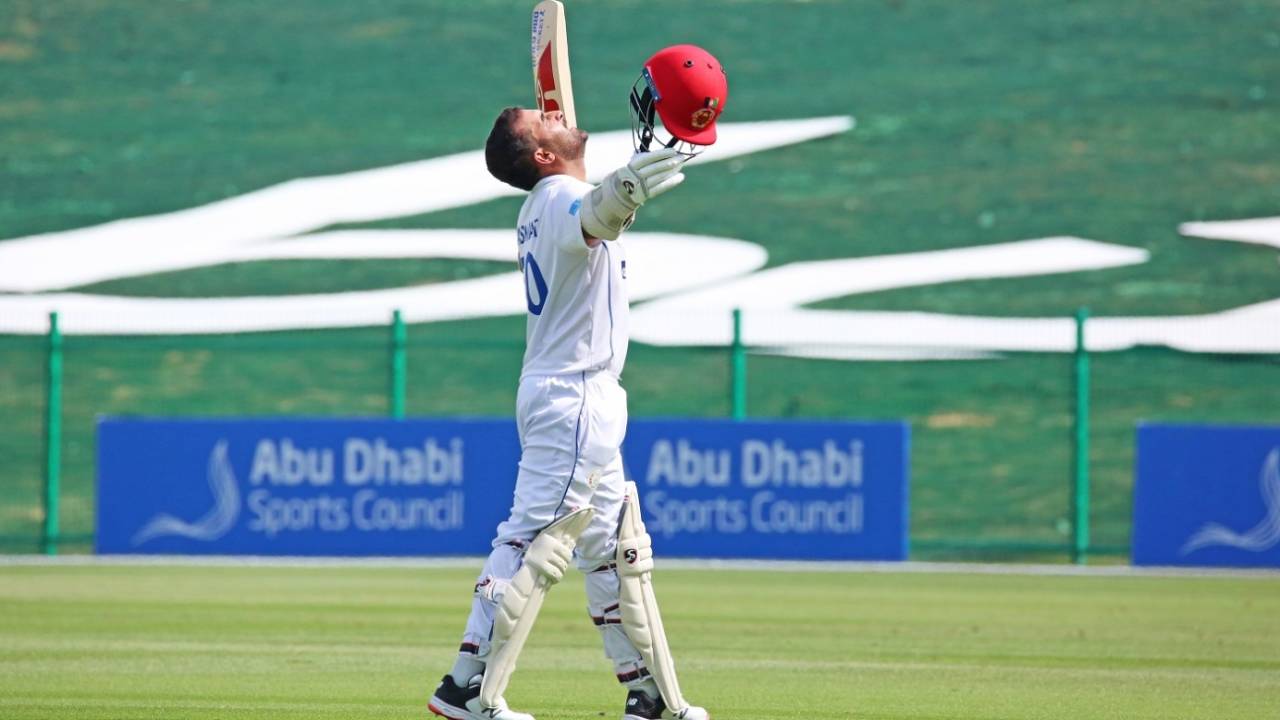Is Hashmatullah Shahidi's double-hundred the fastest for a team in Tests?
And did Sunil Gavaskar open the bowling in his debut Test?
Shahidi's double-hundred came in Afghanistan's sixth Test, the earliest (along with West Indies) that a team has got an individual double-century • Abu Dhabi Cricket
This unique occurrence came during the match between Glamorgan and Yorkshire in Swansea in 1965. Both sides chose four spinners on what the Times called "a dusty brown wicket". It offered assistance from the start: Brian Close took 6 for 52 as Glamorgan were bowled out for 140.
That splendid unbeaten 200 by Hashmatullah Shahidi, in the second Test against Zimbabwe in Abu Dhabi, was indeed Afghanistan's first double-century. It came in their sixth match, which equals the record: Clifford Roach made 209 in West Indies' sixth Test, against England in Georgetown in 1929-30.
As recent celebrations noted, Sunil Gavaskar made his Test debut for India 50 years ago, against West Indies in Port-of-Spain in March 1971. It's strange but true that his first serious action in Tests was as a bowler: he didn't quite take the new ball, but did come on as first change, for what looks like the eighth over of the match. It went for nine runs, and he wasn't asked to deliver another one.

The highest run-aggregate in a Test with a positive result is 1753, in the third Ashes Test of 1920-21, in Adelaide: Australia (354 and 582) beat England (447 and 370) by 119 runs. Like almost all Tests in Australia until the Second World War, this was a timeless match (in other words, it was played to a finish); it ended late on the sixth day. The most runs in a time-limited Test that ended in a positive result is 1723, in another Ashes classic, at Headingley in 1948: Australia (458 and 404 for 3) beat England (496 and 365 for 8 declared) by seven wickets late on the fifth day.
The 1969 book Tiger's Tale was a book by the Nawab of Pataudi, India's captain, looking back on his early career - including the devastating accident that cost him the sight of one eye - and the 1967 tour of England. There have been other books about Pataudi since, but he never put his name to another volume of autobiography before his death in 2011. The title came from his long-standing nickname, "Tiger" - and the same applies to the other book you mention. Time of the Tiger was a biography of the great Australian legspinner of the 1930s, Bill O'Reilly. Published in 1970, it was written by the Australian journalist RS Whitington. When he was nearly 80, Tiger O'Reilly brought out his own book, Sixty Years in Cricket, in 1985.
"Your question about debutants who were dismissed off the first ball of a Test could have a footnote. In his first Test for New Zealand, against England in Wellington in 1977-78, John Wright got a big nick off Bob Willis first ball. Bob Taylor took the catch. But the most important Bob, umpire Monteith, didn't hear anything in the wind and gave Wright not out. He batted the rest of the day and a bit of the second morning for 55."
Steven Lynch is the editor of the updated edition of Wisden on the Ashes
